Our films will screen Wednesday nights at 7:30 pm (unless otherwise noted) at the Portage Theater on 4050 N. Milwaukee Ave. – Admission is $5
Please take note of two special weekend presentations: The Ten Commandments on Saturday, April 7 and A Night to Remember on Sunday, April 15.
Programmed and Projected by Julian Antos, Becca Hall, and Kyle Westphal.
—————–
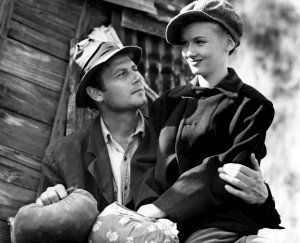 Wednesday, January 4th @ 7:30
Wednesday, January 4th @ 7:30
SULLIVAN’S TRAVELS
Directed by Preston Sturges • 1941
Frustrated with the output of his career to date, Hollywood lightweight John L. Sullivan (Joel McCrea) embarks on a ninety-minute pilgrimage to make a picture of real substance about human suffering and, against his studio’s wishes, leaves Hollywood as a tramp in search of loneliness, sorrow, and despair. Along the way he picks up a very broke, very gorgeous Veronica Lake (here echoing a tall, blonde bombshell version of Louise Brooks in Beggars of Life) and after being slapped in a southern chain gang for messing around in a railroad yard is bested by a church projectionist. It shouldn’t come as a surprise that Sturges’ most sarcastic film is also one of the greatest love letters to motion pictures themselves. Bosley Crowther called it “the best social comment made upon Hollywood since A Star Is Born,” but it’s also a tribute to nontheatrical screening spaces and the element of film-going that gives cinema its strongest sense of purpose: an audience. (JA)
90 min • Paramount Pictures • 35mm from Universal
Cartoon: TBA
Wednesday, January 11th @ 7:30 pm
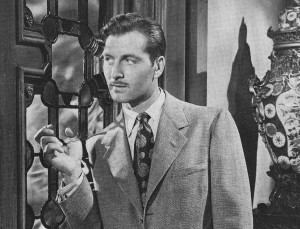 THE BRASHER DOUBLOON
THE BRASHER DOUBLOON
Directed by John Brahm • 1947
The kind of unpretentious, squirrely filmmaking characteristic of 20th Century-Fox productions of the late ‘40s, this Raymond Chandler adaptation (released overseas under the novel’s original title The High Window) stars George Montgomery as a private investigator hired to find a rare coin stolen from domineering widow Florence Bates. Montgomery cautiously seduces Bate’s secretary Nancy Guild (who introduces the film’s tag line “some women can’t stand cats—with me it’s men!”) and eventually gets to the bottom of things, but not before being bludgeoned by a gang of sleazeballs hired by Bate’s lout of a son (Conrad Janis). Mysteriously unavailable on DVD or VHS and absent from television or theatrical screenings for several years, this is B-movie filmmaking at its swiftest and most likable. (JA)
72 min • 20th Century-Fox • 35mm from Criterion Pictures USA
Short: “The Laurel-Hardy Murder Case” (James Parrott, 1930) • 16mm print from the Chicago Film Archives!
Wednesday, January 18th @ 7:30
TURN THE KEY SOFTLY
Directed by Jack Lee • 1953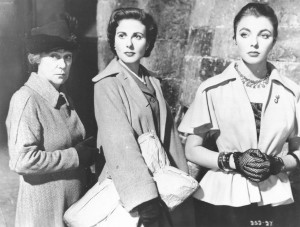
A simple, melancholy picture about three women who get out of Holloway Prison on the same day in rainy, somber London. Yvonne Mitchell landed in jail because of her low-life thief of a boyfriend, Joan Collins is a prostitute hoping for a better life, and Kathleen Harrison is an elderly woman with a weakness for shoplifting. Were it made a few years later, Turn the Key Softly might have been impossibly grim. Instead it’s a film as delicate and honest as any Powell and Pressburger production, made right before England’s cycle of Angry Young Man films turned the industry into something much more dark and hopeless. The gorgeous inner city location photography—from cinematographer Geoffrey Unsworth, better known for his work on 2001: A Space Odyssey—is reason enough to come, but it also balances lives of poverty, loneliness, old age, and occasional optimism and hope in a way that feels very tangible without being excessive or cliché. (JA)
81 min • General Film Distributors • 35mm from the Radio Cinema Film Archive
Short: “At the Stroke of Twelve” (1941, Jean Negulesco) from Warner’s “Broadway Brevity” – 35mm
Wednesday, January 25 @ 7:30
…ONE THIRD OF A NATION…
Directed by Dudley Murphy • 1939
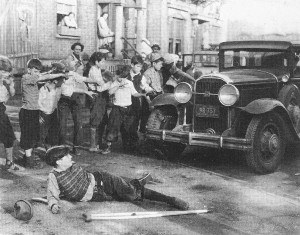 …one third of a nation… is a forgotten emblem of socially progressive, Popular Front entertainment. (Its title even derives from an FDR speech.) The original play by Arthur Arent for the WPA’s Federal Theatre Project displayed a heavily experimental and didactic bent—a ‘Living Newspaper’ about slum conditions, complete with editorial content, statistics, and dramatic journalism. The film version retains only a few of the play’s devices— most notably the dialogue spoken by the tenement itself (!)—while remaining a compassionate condemnation of urban decay. There is a bit of romance added. Slum girl Sylvia Sidney and New York scion Leif Erickson meet-cute in the worst possible way: her tenement is burning down; he arrives on the scene to help and, ever the absentee landlord, doesn’t even realize the building is his property. (Bronx-born Sidney had already become Hollywood’s first choice for tarnished/glamorous parts in vaguely liberal, socially engaged projects such as Street Scene, Fury, You Only Live Once, and Dead End.) Sidney’s younger brother (future director Sidney Lumet, at 14) begs Erickson to tear down the rat trap and takes matters into his own grubby hands when necessary. An independent production shot at Astoria Studios on Long Island (itself something of a tenement), …one third of a nation… is another chapter in the fascinating career of Dudley Murphy (Ballet mécanique, The Emperor Jones). Originally released by Paramount but long since in the public domain, this important artifact has fittingly been returned to circulation by the Library of Congress. (KW)
…one third of a nation… is a forgotten emblem of socially progressive, Popular Front entertainment. (Its title even derives from an FDR speech.) The original play by Arthur Arent for the WPA’s Federal Theatre Project displayed a heavily experimental and didactic bent—a ‘Living Newspaper’ about slum conditions, complete with editorial content, statistics, and dramatic journalism. The film version retains only a few of the play’s devices— most notably the dialogue spoken by the tenement itself (!)—while remaining a compassionate condemnation of urban decay. There is a bit of romance added. Slum girl Sylvia Sidney and New York scion Leif Erickson meet-cute in the worst possible way: her tenement is burning down; he arrives on the scene to help and, ever the absentee landlord, doesn’t even realize the building is his property. (Bronx-born Sidney had already become Hollywood’s first choice for tarnished/glamorous parts in vaguely liberal, socially engaged projects such as Street Scene, Fury, You Only Live Once, and Dead End.) Sidney’s younger brother (future director Sidney Lumet, at 14) begs Erickson to tear down the rat trap and takes matters into his own grubby hands when necessary. An independent production shot at Astoria Studios on Long Island (itself something of a tenement), …one third of a nation… is another chapter in the fascinating career of Dudley Murphy (Ballet mécanique, The Emperor Jones). Originally released by Paramount but long since in the public domain, this important artifact has fittingly been returned to circulation by the Library of Congress. (KW)
79 min • Dudley Murphy Productions • 35mm preserved by the Library of Congress
Short: W. C. Fields in “The Fatal Glass of Beer” (1933, Clyde Bruckman) – 35mm
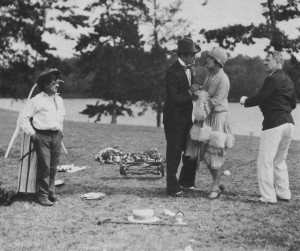 Wednesday, February 1st @ 7:30
Wednesday, February 1st @ 7:30
SO’S YOUR OLD MAN
Directed by Gregory La Cava • 1926
With live organ accompaniment by Jay Warren
W. C. Fields’s trademark persona is so tightly tethered to his slow-burning, frowzily alcoholic verbal delivery that it’s near impossible to imagine him as a silent comic. So’s Your Old Man proves this prejudice deliciously wrongheaded. (Even Fields’s own 1935 talkie remake, You’re Telling Me!, pales beside the original.) Samuel Bisbee (Fields) is a henpecked, inebriated inventor whose latest marvel—the shatterproof windshield—fails to dazzle Detroit. Returning home from the disastrous demonstration, Bisbee learns that he can’t even kill himself properly. Luckily, he meets a beguiling princess (Alice Joyce) on the train back and bumbles his way into becoming a town treasure. Sharply directed by the expert La Cava, So’s Your Old Man is one of the few comedies most readily described as lovely. An early example of Paramount’s house style in full bloom, it even makes suburban New Jersey look picturesque. (KW)
67 min • Paramount Pictures • 35mm preserved by the Library of Congress
Short: “His Wooden Wedding” (Leo McCarey, 1925) – 16mm
Wednesday, February 8 @ 7:30
THE PRIVATE LIFE OF SHERLOCK HOLMES
Directed by Billy Wilder • 1970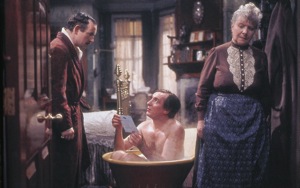
The revisionist spirit was everywhere in Hollywood in the late 1960s, with western mythos receiving special scrutiny in such fare as The Wild Bunch and Little Big Man. Beside these, the private life of one Sherlock Holmes hardly seems like an urgent subject for review, but then, this isn’t an urgent kind of picture. Robert Stephens stars as a cocaine-addicted, possibly homosexual Holmes; Colin Blakely contributes a media-savvy, slight nebbish rendition of Dr. Watson. When a mysterious Belgian woman (Genevieve Page) washes up on the steps of 221B Baker St., Holmes and Watson begin unraveling a mystery that circuitously leads to the rolling hills of Scotland, the Loch Ness Monster, and the nascent military-industrial complex. Taking the core of Arthur Conan Doyle’s characters and venturing blunt conjectures about their secret desires and neuroses, Billy Wilder and I. A. L. Diamond fashion an obsessive and unhurried tribute to Holmes and his world. The consistently astonishing production design by Alexander Trauner recreates every speck of dust on Holmes’s bureau, and Miklos Rosza contributes a highly romantic score. (KW)
125 min • The Mirisch Corporation for United Artists • 35mm from MGM
Cartoon: Daffy Duck in “The Great Piggy Bank Robbery” (Robert Clampett, 1946) – 16mm
Wednesday, February 15 @ 7:30
BACK STREET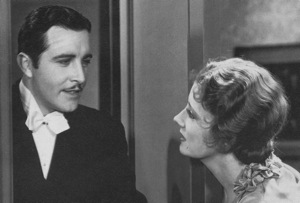
Directed by John M. Stahl • 1932
What would you sacrifice for love? Ray (Irene Dunne) is just another small town girl, a fixture at her father’s Cincinnati storefront. A chance meeting with financier Walter (John Boles) sets off decades of promises, pining, and private love. One chance occurrence prevents Ray from marrying Walter, so she settles instead for being his “back street” secret, a lifelong (and class-conscious) love affair. If the setup sounds conventional, rest assured that no one has ever filmed it with so much weight and emotional resonance as John M. Stahl. (By the end, even a lifetime of romantic misfortune earns a cosmic dignity.) Remembered today largely for the misfortune of having so many of his films remade, but not necessarily improved (Strictly Dishonorable, Imitation of Life, Magnificent Obsession, and two subsequent versions of Back Street), Stahl emerges as a director who treated women’s pictures with a sincerity and sobriety never equaled. (Tom Milne even compared him once to Ozu!) His big-budget Universal melodramas are all ripe for rediscovery. (KW)
93 min • Universal Pictures • 35mm from Universal
Cartoon: Woody Woodpecker in “Drooler’s Delight” (1949, Dick Lundy) – 35mm
Wednesday, February 22 @ 7:30
TOO LATE BLUES
Directed by John Cassavetes • 1961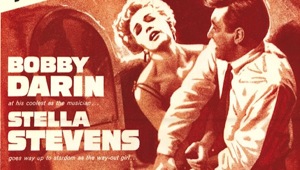
Bobby Darin is straight-laced blues musician John “Ghost” Wakefield; Stella Stevens is the singer who convinces Ghost to leave his band in search of fame (and breaks his heart). This was the first film John Cassavetes directed for a major studio (and his first in 35mm), and his relationship with Paramount was tumultuous (an article in the New York Times suggests that Cassavetes was slated to direct a string of low-budget pictures for the studio that were shelved after the film’s release). The result is a picture about the dangers of selling out that ends up as naïve and sincere as Cassavetes’ appeal in the trailer: “This is a film about people I know,” he says, “the night people, the jazz musicians, the drifters and dreamers, the floaters, the chicks, the smilers, the hangers-on, the phonies, too much sex, not enough love—and they live in a world of too late blues.” (JA)
103 min • Paramount Pictures • 35mm from the Radio Cinema Film Archive
Cartoon: “Little Boy With a Big Horn” (Robert Cannon, 1953) – 35mm
Wednesday, February 29 @ 7:30pm
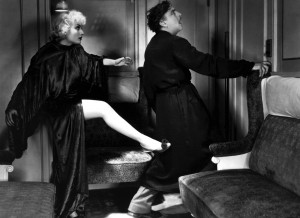 TWENTIETH CENTURY
TWENTIETH CENTURY
Directed by Howard Hawks • 1934
Broadway producer John Barrymore brings starlet Carole Lombard into the public eye just as his career hits the skids. They part ways and meet again on board the 20th Century Limited, where he tries desperately to resign Lombard, but the young actress wants nothing to do with it. Thought by Andrew Sarris to be the best film of 1934, and by many to be the best of Hawks’s comedies, the chemistry between Barrymore and Lombard is unmatched. Hawks convinced Barrymore to take the role by billing it as the story of the biggest ham on earth, and John Baxter wrote of Barrymore in Hollywood in the Thirties that “[he] justifies in one role his immense reputation. Cajoling, demanding, even in once scene vamping the harassed Lombard, he projects a perfect image of Broadway panache and insanity.” (JA)
91 min • Columbia Pictures • 35mm from Sony Pictures Repertory
Short: “So You Want a Model Railroad” (1955, Richard L. Bare) – 35mm
Wednesday, March 7 @ 7:30
GIVE US THIS DAY (CHRIST IN CONCRETE)
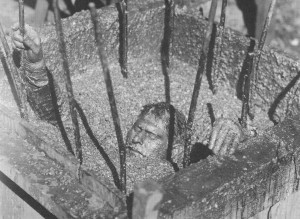 Directed by Edward Dmytryk • 1949
Directed by Edward Dmytryk • 1949
Originally pitched as the American debut of director Roberto Rossellini (!), this moving adaptation of Pietro di Donato’s experimental proletarian novel Christ in Concrete was finally made in England’s Denham Studios by top-line talent recently blacklisted in America: actor Sam Wanamaker, screenwriter Ben Barzman, and director Edward Dmytryk. Pressure from the American Legion kept the film from playing more than a handful of engagements, but the show is hardly hardline Communist propaganda. Instead, Give Us This Day simply sketches the nearly insurmountable odds of succeeding in America for bricklayer Geremio (Wanamaker) and his wife Annuziata (Lea Padovani). Their modest dream (a house of their own) is always just out of reach, even when Geremio becomes a foreman and must weigh cost-costing and unsafe work practices against mounting domestic tension. Dour but never less than gripping, the gulf between Give Us This Day and the rest of Dmytryk’s work is skyscraper-sized. Alas, Dmytryk’s subsequent recanting of his hostile HUAC testimony and unforgivable decision to name names has buried this one-of-a-kind experience. (KW)
120 min • Eagle-Lion • 35mm preserved by the Library of Congress
Short: “What’s Your IQ?” (Pete Smith, 1940) – 35mm Technicolor
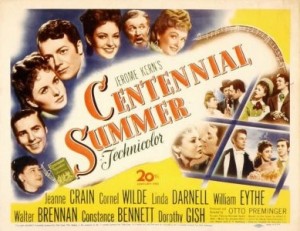 Wednesday, March 14 @ 7:30
Wednesday, March 14 @ 7:30
CENTENNIAL SUMMER
Directed by Otto Preminger • 1946
This bizarre, somewhat mean-spirited (but highly endearing) Otto Preminger musical stars Jeanne Crain and Linda Darnell as two sisters pining after Cornel Wilde at the 1876 Centennial International Exhibition in Philadelphia. Walter Brennan is the father of the family, who hopes to escape his lout of a boss and railroad job by selling a giant clock to the head of the company, and Dorothy Gish (!) is his wife, who is naturally very concerned about the whole affair. The film was met with mixed critical reception, mostly because of its obvious attempt to recreate MGM’s Meet Me In St. Louis for 20th Century-Fox—but there’s a lot to enjoy here: Jerome Kern’s last score (he suffered a cerebral hemorrhage shortly before the film’s release while walking the streets of New York), Preminger’s swift direction, some shockingly unsubtle gynecological references, a wonderful drunken Walter Brennan sequence, and (for this screening at least) a gorgeous original Technicolor print. (JA)
102 min • 20th Century-Fox • 16mm from the Radio Cinema Film Archive
Short: “Musical Memories” (Fleischer Color Classic, 1935) – 16mm
Wednesday, March 21 @ 7:00
REDS
Directed by Warren Beatty • 1981
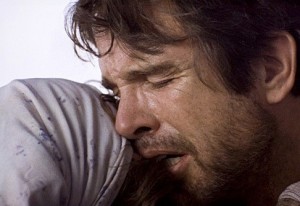 In the midst of the Reagan Revolution, Paramount courageously released a truly epic film chronicling the Russian Revolution and its aftermath, ostensibly because star-director-producer-cowriter Warren Beatty had delivered a pearly blockbuster for the studio in Heaven Can Wait. It’s difficult to imagine a more discordant (and superior) sophomore effort. Beatty plays American expat journalist John Reed, author of Ten Days That Shook the World and key player in the internecine struggles over which American leftist faction would become the anointed Soviet satellite. (The attention to such ideological arcana is as bracing as the movie’s overall political commitment.) As history, Reds offers neither saints nor scoundrels: Reed’s complicated marriage to Louise Bryant (Diane Keaton, never better) receives as much scrutiny as the finer points of revolutionary strategy. Everything is a continuum, with political and sexual freedom naturally commingling with developments in photography and American popular song (the latter expertly arranged by Stephen Sondheim). This enormous canvas is flanked by other historical figures, both enacted (Jack Nicholson as Eugene O’Neill, Maureen Stapleton as Emma Goldman) and actual (George Jessel, Will Durant, Henry Miller, Adela Rogers St. Johns, and a host of other ‘witnesses’ who offer interstitial testimony). Masterfully crafted, with Dede Allen’s fleet editing a particular standout. (KW)
In the midst of the Reagan Revolution, Paramount courageously released a truly epic film chronicling the Russian Revolution and its aftermath, ostensibly because star-director-producer-cowriter Warren Beatty had delivered a pearly blockbuster for the studio in Heaven Can Wait. It’s difficult to imagine a more discordant (and superior) sophomore effort. Beatty plays American expat journalist John Reed, author of Ten Days That Shook the World and key player in the internecine struggles over which American leftist faction would become the anointed Soviet satellite. (The attention to such ideological arcana is as bracing as the movie’s overall political commitment.) As history, Reds offers neither saints nor scoundrels: Reed’s complicated marriage to Louise Bryant (Diane Keaton, never better) receives as much scrutiny as the finer points of revolutionary strategy. Everything is a continuum, with political and sexual freedom naturally commingling with developments in photography and American popular song (the latter expertly arranged by Stephen Sondheim). This enormous canvas is flanked by other historical figures, both enacted (Jack Nicholson as Eugene O’Neill, Maureen Stapleton as Emma Goldman) and actual (George Jessel, Will Durant, Henry Miller, Adela Rogers St. Johns, and a host of other ‘witnesses’ who offer interstitial testimony). Masterfully crafted, with Dede Allen’s fleet editing a particular standout. (KW)
Please note early start time.
194 min, with intermission • Paramount Pictures • 35mm from Paramount
Cartoon: Porky Pig in “Old Glory” (1939, Chuck Jones) – 35mm
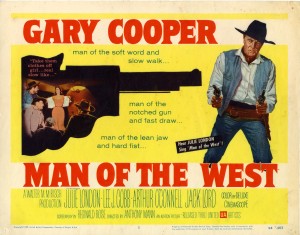 Wednesday, March 28 @ 7:30
Wednesday, March 28 @ 7:30
MAN OF THE WEST
Directed by Anthony Mann • 1958
Set in 1874 Arizona, reformed ex-gunman Gary Cooper sets out to hire a schoolteacher for his small town with the savings of local residents. When his train is robbed, Cooper and fellow escapees Julie London and Arthur O´Connell end up stranded in the middle of nowhere and are held hostage by a gang of outlaws Cooper used to ride with. All the elements of an Anthony Mann western are present: mountains and landscapes as characters, quick, startling moments of violence, and tense, disjointed exchanges between characters with good intentions and those with bad ones. What makes Man of the West stand out among the rest of Mann’s work, however, is how exhausted and beaten down every gesture of the film looks and feels. Cooper’s portrayal of a man who can barely take another bad turn and simply wants a better life is among the greatest and most sympathetic in any western, and Anthony Mann’s last great film is also his saddest and darkest. (JA)
100 min • Ashton Productions • 35mm from MGM
Short: Betty Boop in “The Bum Bandit” (Dave Fleischer, 1931)
Wednesday, April 4 @ 7:30
LIEBELEI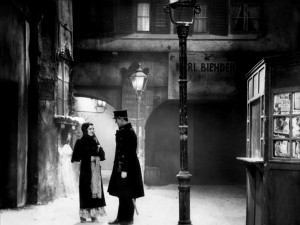
Directed by Max Ophüls • 1933
Vienna, 1900. Love blossoms between young lieutenant Fritz (Wolfgang Liebeneiner) and violinist’s daughter Christine (Magda Schneider), but his past affairs threaten to destroy their union. Significantly anticipating the milieu and atmosphere of Ophüls’s American masterpiece, Letter from an Unknown Woman, Liebelei was the director’s greatest success in his native Germany. By the time it opened in March 1933, Hitler had ascended to power, the distributor had removed the names of both Ophüls and playwright Arthur Schnitzler (both Jews) from the credits, and Ophüls had fled the country, embarking on a fugitive career that never returned to normalcy. He would return to adapting Schnitzler’s work nearly two decades afterwards in La ronde with equally romantic and enchanting results. (KW)
In German with English subtitles
88 min • Elite-Tonfilm-Produktion • 16mm from private collections
Short: “Any Little Girl That’s a Nice Little Girl” (Fleischer Screen Song, 1931) – 16mm
Special Saturday Presentation
Saturday, April 7 @ 7:00
THE TEN COMMANDMENTS
Directed Cecil B. DeMille • 1956
 A wonderfully overblown remake of his 1923 film of the same name, Cecil B. DeMille’s 1956 The Ten Commandments (in VistaVision, Technicolor, and running nearly four hours long) was also the great director’s swan song to the silver screen (he retired shortly after suffering a heart attack on set atop a 107-foot ladder). DeMille died in 1959, but not before, as Variety put it, “throwing sex and sand at the eyes of his audience for twice as long as anyone in Hollywood had ever dared to.” The Ten Commandments’ merits as a piece of serious filmmaking may occasionally run dry, but nobody before or since has been able to achieve the level of ferocious terror and sensuality in a biblical epic seen here. Immensely popular on its release, it has also been screened on a Saturday in April on ABC since 1973, and re-released several times in 35 and 70mm (the latter billed as the totally bogus Super VistaVision, which cropped the top and bottom of the original negative to accommodate a wider 70mm frame). We’ll be presenting it as it was meant to be seen: in an original IB Technicolor print, with an intermission and DeMille’s impassioned introduction. With Charlton Heston, Yul Brynner, Anne Baxter, Edward G. Robinson, Yvonne De Carlo, Debra Paget, John Derek, Sir Cedric Hardwicke—and Vincent Price! (JA)
A wonderfully overblown remake of his 1923 film of the same name, Cecil B. DeMille’s 1956 The Ten Commandments (in VistaVision, Technicolor, and running nearly four hours long) was also the great director’s swan song to the silver screen (he retired shortly after suffering a heart attack on set atop a 107-foot ladder). DeMille died in 1959, but not before, as Variety put it, “throwing sex and sand at the eyes of his audience for twice as long as anyone in Hollywood had ever dared to.” The Ten Commandments’ merits as a piece of serious filmmaking may occasionally run dry, but nobody before or since has been able to achieve the level of ferocious terror and sensuality in a biblical epic seen here. Immensely popular on its release, it has also been screened on a Saturday in April on ABC since 1973, and re-released several times in 35 and 70mm (the latter billed as the totally bogus Super VistaVision, which cropped the top and bottom of the original negative to accommodate a wider 70mm frame). We’ll be presenting it as it was meant to be seen: in an original IB Technicolor print, with an intermission and DeMille’s impassioned introduction. With Charlton Heston, Yul Brynner, Anne Baxter, Edward G. Robinson, Yvonne De Carlo, Debra Paget, John Derek, Sir Cedric Hardwicke—and Vincent Price! (JA)
220 min, with intermission • Paramount Pictures • 35mm from private collections
Wednesday, April 18 @ 7:30
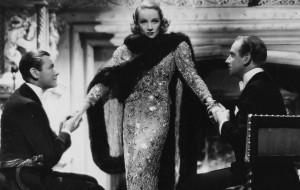 ANGEL
ANGEL
Directed by Ernst Lubitsch • 1937
“You really let all Europe wait just to find out if a woman is a brunette?” Marlene Dietrich, in the final film on her Paramount contract, stars as the continent-hopping wife of statesman Herbert Marshall. Their marriage is contented and unquarrelsome until she spends an afternoon in the Paris salon of a celebrated Russian émigré and falls for Englishman Melvyn Douglas, who knows her only as “Angel.” Torn between an affair with a man she hardly knows and the frustrating status quo with a husband more attentive to Yugoslavia’s problems than her own, Dietrich must improvise a tidy end to an untidy love triangle. Mysteriously neglected, despite Lubitsch, Dietrich, Marshall, and screenwriter Samson Raphaelson all in top form, Angel is a wise and observant film about bedroom diplomacy and the negotiation at the heart of all marriages. (KW)
91 min • Paramount Pictures • 35mm from Universal
Cartoon: Popeye in “For Better or for Worser” (Dave Fleischer, 1935) – 16mm
Special Sunday Presentation – Titanic Centennial
Sunday, April 15 @ 7:30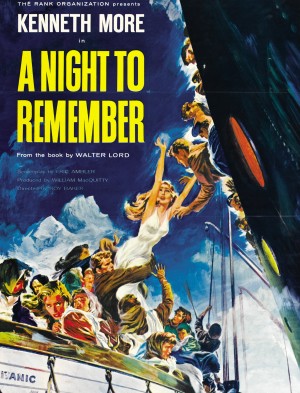
A NIGHT TO REMEMBER
Directed by Roy Ward Baker • 1958
No film record exists of the Titanic’s launch or, needless to say, of its sinking. The 1912 tragedy was instantly, insistently commemorated in popular culture—the ultimate topical subject, with folk songs like “When That Great Ship Went Down” establishing the facts and moral lessons for decades to come. The culture itself recognized a void—a scientific death sentence beyond imagination—and strove to claim it. The 1955 publication of advertising copywriter Walter Lord’s book A Night to Remember set a new standard in popular history, with accounts from over sixty survivors and reams of original research brought to bear upon meticulous documentary reportage. The same factual aesthetic is imported to cinema with notable seriousness-of-purpose in the 1958 version, which plays like a feature-length remembrance. (Might we suggest Paul Greengrass’s United 93 as a modern parallel?) Producer William MacQuitty had witnessed the Titanic’s launch as a boy of six, and A Night to Remember indeed assumes that the audience has considerable personal feelings wrapped up in the event. Though it includes a few composite characters, A Night to Remember recreates the tragedy with uncommon accuracy and vigor; the narrative focus is diffuse and democratic, though quick and moving portraits of second mate Charles Lightoller (Kenneth More) and Titanic designer Thomas Andrews (Michael Goodliffe) emerge. Obviously studied by James Cameron in preparation for his canonical 1997 version, A Night to Remember remains a fitting and moving commemoration of the now century-old event. (RH)
123 min • The Rank Organisation • 35mm from MGM
Short: Original 35mm trailer for Titanic (1997, James Cameron)
